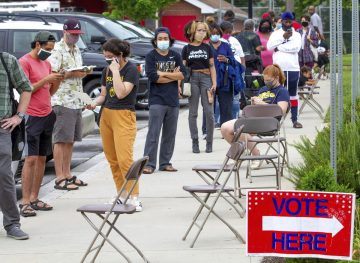by Mark Harvey
“I consider it completely unimportant who in the party vote, or how; but what is extraordinarily important is this–who will count the votes and how.” –Joseph Stalin
 In the game of chess, there are dramatic moves such as when a knight puts the king in check while at the same time attacking the queen from the same square. Such a move is called a fork, and it’s always a delicious feeling to watch your opponent purse his lips and shake his head when you manage a good fork. The most dramatic move is obviously checkmate, when you capture the king, hide your delight, and put the pieces back in the box. But getting to either the fork or checkmate involves what’s known in chess as positioning, and for the masters, often involves quiet moves long in advance of the victory.
In the game of chess, there are dramatic moves such as when a knight puts the king in check while at the same time attacking the queen from the same square. Such a move is called a fork, and it’s always a delicious feeling to watch your opponent purse his lips and shake his head when you manage a good fork. The most dramatic move is obviously checkmate, when you capture the king, hide your delight, and put the pieces back in the box. But getting to either the fork or checkmate involves what’s known in chess as positioning, and for the masters, often involves quiet moves long in advance of the victory.
I wouldn’t compare Republican operators to a Garry Kasparov or Magnus Carlsen, but in several swing states that could determine the 2024 presidential elections, they are playing their own version of a quiet game and positioning to win the election by hook or by rook. As opposed to a Kasparov or a Carlsen, there’s nothing elegant about their strategy, and what they’re attempting to do is really an end-around any form of democracy. It involves the chess equivalent of mid-level pieces—bishops, knights, and even pawns–and in some cases, political positions you’ve probably never heard of.
The Republicans have taken a clinical look at the demographics, the voting trends, and the results of the 2020 election and concluded that a traditional play of just big money and ugly ads won’t do it next time. Yes, there will be a lot of ads with dark music, photoshopped images (using the darkening and contrast feature), and the menacing voice-over saying, “Candidate X wants to free all the criminals, raise your taxes to Venezuelan levels, and concede Texas to Russia.”
But to win in 2024, Republicans are working to change basic electoral rules, install vote counters and election judges, and make it much more difficult for those who would vote against their candidate to vote. You don’t have to be a grandmaster of politics to understand the plan and to see it happening in plain sight. But I fear that the average American voter, due to either the hazards of having a real life or lacking interest, is missing the beat. Read more »

